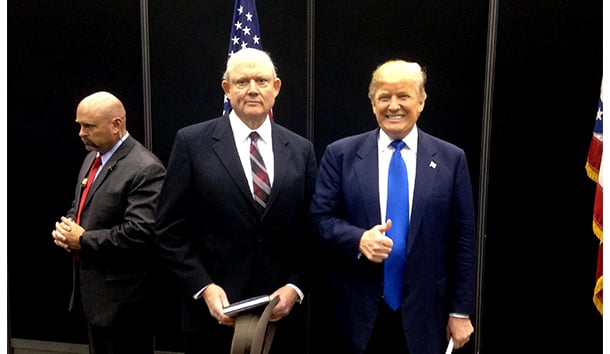The surprising triumph of Donald Trump has produced what can only be described as an extended temper tantrum by much of the American left, which fully expected a victory by Hillary Clinton to be followed by unending political dominance, as the white, Christian parts of America that generally vote Republican are gradually eclipsed demographically by the nonwhite, non-Christian parts of America that generally vote for Democrats. The left was so confident of victory that it could not wait until the election was over before revealing its disdain for Middle America, with Clinton branding half of Trump’s supporters as “deplorable” and not even bothering to seek the support of white voters living in unfashionable parts of America or holding unfashionable beliefs. Clinton never deigned to campaign in Michigan or Wisconsin and even turned down an opportunity to give a Saint Patrick’s Day address at Notre Dame because, as the New York Times reported after the election, her campaign saw no need to appeal to white Catholics. Since Hillary’s return to Chappaqua, the left’s disdain for Trump and his supporters has only intensified, as evidenced by everything from self-righteous speeches by celebrities, contemptuous monologues from late-night comedians, and unremitting media hostility to physical assaults on Trump supporters in Berkeley and campus riots designed to prevent a Trump supporter from speaking at Berkeley and a scholar from describing the problems afflicting the white working class at Middlebury. What underlies all of this is a profound intolerance: While most American conservatives still see those to their left as merely misguided, many on the American left now view those to their right as evil.
In point of fact, Trump is far from being the “racist” and “fascist” of the left’s imagining, and his appeal to an American nationalism that values all Americans over non-Americans is designed to unify the country and resembles the nationalism of statesmen such as William McKinley, who helped to reunite Americans after the Civil War. But if the left persists in using its cultural power to vilify the parts of America it cannot abide, the result may well be disunion. One way such a breakup of the American Republic could occur is described in William Lind’s entertaining and erudite novel Victoria (published under the nom de plume Thomas Hobbes), which describes how leftist intolerance precipitates a revolt that begins in northern New England and eventually engulfs the entire country. Although the American right eventually triumphs in Lind’s novel—the ruins of Berkeley are sown with salt—the unraveling of America is still presented as the tragedy it would be. As Lind’s narrator says at the beginning of the novel,
As late as the mid-1960s—God, it’s hard to believe—America was still the greatest nation on earth, the most productive, the freest, the top superpower, a place of safe homes, dutiful children in good schools, strong families and a hot lunch for orphans.
Later on, the narrator laments, “Ex Uno, Plura. Thank you, ‘multiculturalism.’ See you in Hell.”
Two principal factors allow American conservatives to triumph in Victoria. One is understanding the ideology that animates today’s left, an ideology that is often referred to as political correctness but which Lind labels “Cultural Marxism,” and which derives from the work of the Frankfurt School, Antonio Gramsci, and György Lukács. Lind describes Cultural Marxism as “Marxism translated from economic into cultural terms.” Just as “Classical Marxism defined the working class as virtuous and the bourgeoisie as evil—without regard to what members of either class did,” Cultural Marxism “defined blacks, Hispanics, feminist women, and homosexuals as good, and white men as evil—all, again, with no attention to anyone’s behavior.” This description, of course, is perfectly consistent with the behavior of much of the American left since the rise of Trump. The other is the embrace of what Lind calls “Retroculture.” As one of Lind’s characters explains,
You cannot create, or more precisely, re-create, the world we want simply through words, least of all through the words of politicians. You have to do it by how you live. The Retro culture Movement is people—individuals, families, sometimes whole neighborhoods—striving to live again in the old ways, following the old rules.
The character who speaks these lines drives a 1948 Buick Roadmaster and listens to old radio programs, just as many people I know enjoy radio programs and movies first aired long before they were born.
There is much food for thought in Lind’s novel, which can be enjoyed by all types of American conservatives, except neocons and devotees of finance capitalism. It seems to me, though, that the novel underestimates how difficult it will be to unseat Cultural Marxism. In Victoria, explaining the intellectual origins of Cultural Marxism is generally sufficient to discredit it. I doubt that the typical recipient of years of politically correct indoctrination would change his beliefs once he comes to realize that they originated with the likes of Adorno and Marcuse, particularly since those beliefs now confer the respectability craved by Americans since our country began, as noted by observers as varied as Tocqueville, Solzhenitsyn, and Clyde Wilson. But perhaps I am underestimating the resilience of the Deplorables. After all, very few of our cognoscenti predicted that they would succeed in putting a brash billionaire from Queens in the White House.

Leave a Reply